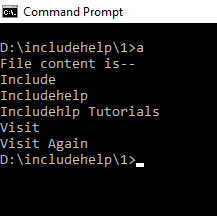C 中的 fclose() 函數
原型:
int fclose(FILE *filename);
參數:
FILE *filename
返回類型:整型
函數的使用:
當我們在程序中處理多個文件並且在操作結束後,如果我們不關閉文件,則會發生一些不需要的修改(如修改數據、破壞文件、丟失數據等)。所以在我們的文件處理操作結束後,我們必須關閉打開的文件,fclose() 函數用於關閉打開的文件。這個函數的原型是int fclose(FILE *filename);
如果 fclose() 函數返回值為零則成功執行,否則返回值 EOF 表示發生錯誤。當文件從磁盤永久刪除時,fclose() 函數失敗。
C 中的 fclose() 示例
#include <stdio.h>
#include <stdlib.h>
int main()
{
FILE* f;
char str[100];
//Check the existence of that file
if ((f = fopen("includehelp.txt", "r")) == NULL) {
printf("Cannot open the file...");
//if not exist program is terminated
exit(1);
}
printf("File content is--\n");
//print the strings until EOF is encountered
while (!feof(f)) {
fgets(str, 100, f);
//print the string
printf("%s", str);
}
//close the opened file
fclose(f);
return 0;
}輸出

相關用法
- C語言 fread()用法及代碼示例
- C語言 feof()用法及代碼示例
- C語言 fillellipse()用法及代碼示例
- C語言 fgets()用法及代碼示例
- C語言 freopen()用法及代碼示例
- C語言 frexp()用法及代碼示例
- C語言 fseek() vs rewind()用法及代碼示例
- C語言 fflush()用法及代碼示例
- C語言 fgetc()用法及代碼示例
- C語言 fputc()用法及代碼示例
- C語言 fputs()用法及代碼示例
- C語言 fillpoly()用法及代碼示例
- C語言 ftell()用法及代碼示例
- C語言 fseek()用法及代碼示例
- C語言 fgets() and gets()用法及代碼示例
- C語言 fscanf()用法及代碼示例
- C語言 ferror()用法及代碼示例
- C語言 fgetc() and fputc()用法及代碼示例
- C語言 fwrite()用法及代碼示例
- C語言 fork()用法及代碼示例
注:本文由純淨天空篩選整理自Souvik Saha大神的英文原創作品 fclose() function in C language with Example。非經特殊聲明,原始代碼版權歸原作者所有,本譯文未經允許或授權,請勿轉載或複製。
